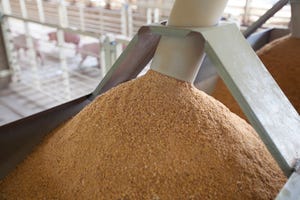Legislative Watch: Proposed Senate budget does not include ag cuts; safety net, conservation payments begin; workforce legislation introduced; USDA staff confirmed.

The Senate Budget Committee’s proposed fiscal year 2018 budget resolution which will be used for considering tax reform later this year does not include any cuts for agriculture. This will be very helpful to the Senate Agriculture Committee when it begins consideration of the 2018 farm bill next year.
The Republican leadership wants to use budget reconciliation as a means to pass tax reform with a simple majority vote in the Senate, and not the 60 votes necessary to avoid a filibuster. The House passed a $4.1 trillion budget resolution which will require the House Agriculture Committee to cut $10 billion over 10 years. The cuts are expected to come from the Supplemental Nutrition Assistance Program.
After the budget resolutions clear both the House and Senate, a conference committee will have to resolve the differences. Agricultural groups are hoping the final budget resolution will require no cuts to the 2018 farm bill.
Farm safety net and conservation payments begin
Over $9.6 billion in farm safety net and conservation payments started this week with USDA beginning to make Agriculture Risk Coverage, Price Loss Coverage and Conservation Reserve Program payments.
USDA is issuing approximately $8 billion in ARC and PLC program payments for the 2016 crop year, and $1.6 billion under CRP for 2017. USDA estimates that over half a million producers will receive ARC payments and over a quarter million producers will receive PLC payments for 2016 crops.
Payments are being made to producers who enrolled base acres of barley, corn, grain sorghum, lentils, oats, peanuts, dry peas, soybeans, wheat and canola. They payments started this week and will continue over the next several months.
Ag workforce legislation introduced
Congressman Bob Goodlatte (R-VA), chairman of the House Judiciary Committee, has introduced the Agricultural Guestworker Act, which would establish a new agricultural guest worker visa program to replace the current H-2A program.
The new program would authorize temporary foreign workers for an initial stay in the United States for up to 36 months. Workers would need to return to their home country for one month for every year in the United States.
Undocumented workers, who can demonstrate agriculture work experience over the past two-years, could receive an H2-C visa. There is an initial cap of 500,000 workers that would be allowed under the new program. The number could be adjusted depending on U.S. agriculture labor demand.
The bill’s intent is to authorize H-2C workers in meat and poultry plants to conduct slaughter and fabrication activities, but exclude other processing activities, such as cooking. The activities allowed for H-2C workers would be determined by USDA through rulemaking.
Censky and McKinney confirmed
The Senate confirmed by voice vote the nominations of Steve Censky as deputy secretary of Agriculture and Ted McKinney as undersecretary of Trade and Foreign Agricultural Affairs.
Censky and McKinney are highly qualified and their nominations were strongly supported by farm organizations, commodity groups and agribusiness.
About the Author(s)
You May Also Like



